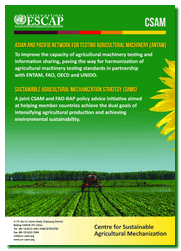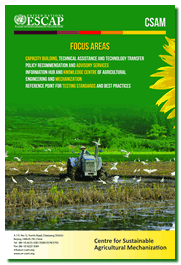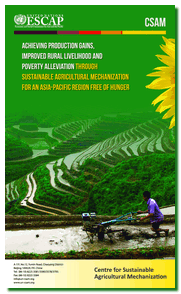United Nations Launches Zero Hunger Challenge in Asia and the Pacific

The United Nations launched the Zero Hunger Challenge in Asia and the Pacific here today in the presence of top national leaders, calling on governments, farmers, scientists, business, civil society and consumers to join hands to end hunger in the region where the majority of the world’s undernourished people live.
“We cannot rest while so many people go hungry in a world where there is enough food for all,” United Nations Deputy Secretary-General Jan Eliasson told the launch ceremony which was attended by the Prime Minister and Minister of Defense and Security of Timor-Leste, Mr. Kay Rala Xanana Gusmão, the Prime Minister of Solomon Islands, Mr. Gordon Darcy Lilo, and the Deputy Prime Minister and Minister of Agriculture and Cooperatives of Thailand, Mr. Yukol Limlamthong.
“Sustainable development and inclusive growth will not happen on empty stomachs,” said Dr. Noeleen Heyzer, United Nations Under-Secretary-General and Executive Secretary of the United Nations Economic and Social Commission for Asia and the Pacific (ESCAP).
“It is unacceptable that in the 21st century, with all of our technological and agricultural expertise, more than 870 million people globally wake up hungry every morning, try to find the energy to make a living for their families through the day, and then still go to bed hungry at night,” the ESCAP Executive Secretary added.
“Despite efforts to reduce hunger, and even with the rapid economic growth seen in much of Asia, progress in eradicating hunger has been very slow,” said Hiroyuki Konuma, Food and Agriculture Organization of the United Nations (FAO) Assistant Director-General and Regional Representative for Asia and the Pacific.
“One in every eight people in Asia-Pacific lacks the most basic human right because they are victims of chronic hunger. Nearly two-thirds of the world’s chronically hungry people live in the Asia-Pacific region,” he said, adding that the “MDG Goal of reducing the proportion of extreme hunger by 2015 and eradicating hunger within our lifetime are still achievable if we work harder, doubling our effort as a team.”
The global ‘Zero Hunger Challenge’, proposed by United Nations Secretary-General Ban Ki-moon during the United Nations Conference on Sustainable Development (Rio+20) in June 2012 has five objectives: 1) 100 per cent access to food for all, all year round; 2) end to stunting among children under two because of a lack of nutrients during pregnancy and in the early days of life; 3) ensuring sustainable food systems; 4) doubling smallholder productivity and income; and 5) reduction in food loss, at the farmer level, through lack of suitable storage and reduction of waste of food by retailers and consumers.
“The attainment of the Millennium Development Goal on poverty and hunger in this region during the remaining 1000 days in a big push is the first step to eliminating hunger,” Mr. Eliasson said. “We are counting on all partners to come together and make this happen. Governments, farmers, scientists, activists, businesses and consumers in Asia-Pacific all have to be part of this effort.”
The Asia-Pacific Zero Hunger Challenge was launched during the 69th ESCAP Commission session by the United Nations Regional Coordination Mechanisms in Asia-Pacific, which is chaired by the United Nations Deputy Secretary-General.



